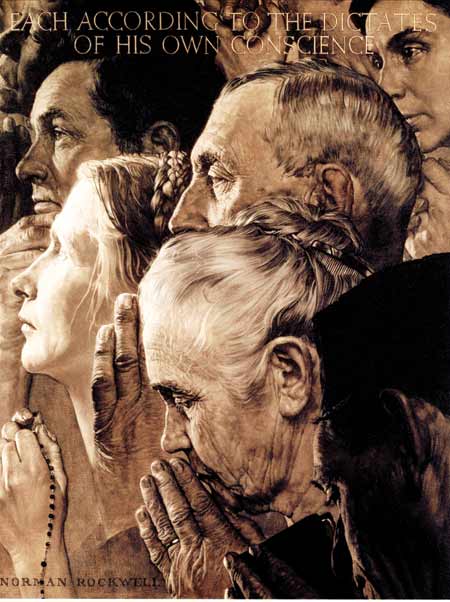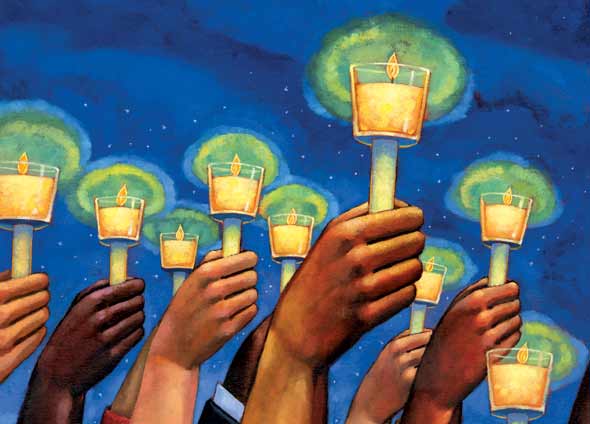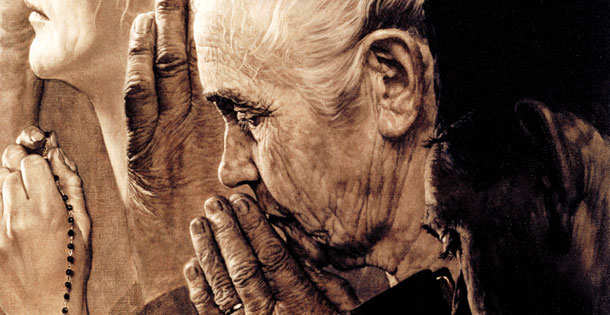
Norman Rockwell
The Saturday Evening Post
February 27, 1943
Sitting in the 250-year-old Quaker meetinghouse high in the mountains of Vermont, I can almost touch the deep, round silence that connects those who have gathered here for worship this beautiful winter morning. The handful of men and women scattered on the old benches sit with their heads bowed, hands resting quietly in their laps or tucked under one of the hand-knit afghans placed around the room to counter the morning chill.
Most of those present have their eyes closed, and one, I suspect, is fast asleep. But another is looking thoughtfully out one of the two-story windows toward the forest, and another, hands lifted up, eyes closed, gently sways back and forth. A log shifts in the old wood stove. The silence shifts as well, and slowly eyes open and meet, smiles appear, and hands reach out one to the other in greeting.
Praying with others can be a richly textured experience. Whether it’s done in the silence of a Quaker meeting or as part of a group singing an ancient melody with its origins deep in the sands of the Negev, communal prayer is often a joyously multidimensional experience that  moves us into a new space. “Prayer is a doorway to God,” explains Brent Bill, Quaker pastor, director of the New Meetings Project for Friends General Conference and author of the 2014 book Finding God in the Verbs: Crafting a Fresh Language of Prayer. “It’s an opportunity to open ourselves, engage in an authentic dialogue, and get as close to God as possible.”
moves us into a new space. “Prayer is a doorway to God,” explains Brent Bill, Quaker pastor, director of the New Meetings Project for Friends General Conference and author of the 2014 book Finding God in the Verbs: Crafting a Fresh Language of Prayer. “It’s an opportunity to open ourselves, engage in an authentic dialogue, and get as close to God as possible.”
Rabbi Elie Kaunfer, executive director of the Mechon Hadar education center in New York and author of Empowered Judaism, agrees. “In Jewish practice, men and women are required to pray three times a day in a group called a minyan,” he says. It can be a rigorous schedule for those unaccustomed to it, but, he adds, “it’s been my experience that being in a room where dozens of people are praying together pushes me to a different place. It allows me to ride the enthusiasm of others, concentrate better and focus more on prayer.”
Nor is the effect limited to the minyan. Catholics who stand and clasp hands to recite the Our Father prayer report the same experience, as do Protestants who respond in unison to biblical readings from the pulpit, Quakers who sit silently in God’s presence, and Muslims who kneel shoulder to shoulder in daily prayers.
When Edgar Hopida, communications director for the Islamic Society of North America, hears the afternoon call to prayer over his office intercom in Plainfield, Indiana, for example, he welcomes the opportunity to walk downstairs to the building’s prayer room, remove his shoes, and stand, shoulder to shoulder, with others to pray. “I’ll be stressing at work, and then I get into prayer, and I realize — ‘Yeah, I can get through this day,’” Hopida says. “Prayer with others helps me focus on the divine and those with whom I pray.”
The power of group prayer is one that Debbie Eaton, head of women’s ministries at the 20,000-member Saddleback Church in Southern California, sees every day. Whether she’s praying with one other woman or 450, the result is the same.
“When I’m praying with someone, particularly with someone who is struggling, judgment just goes away,” Eaton says. “They could be telling me the most horrible thing, and I just see them in the light of love. I can sense God holding that person — and I feel such joy, peace, and love.”
A few miles up the California coast, Carolyn Taketa, director of small groups at Calvary Community Church in Westlake Village, shares Eaton’s perspective. “There’s a sense of unity, power, care, and support in communal prayer,” she explains. “In a small group that prays, it doesn’t matter that you’re a CEO, that you have special needs, or that you’re homeless. All that stuff gets stripped away. There’s just you, your friends, and a clear sense of God’s presence.”
She sighs. “There’s such power, beauty, and simplicity in that.”
When a friend in Taketa’s prayer group shared that her marriage was over, for example, the group cried with her for the loss of her husband, the pain to her children, and the bad choices that had been made as the marriage unraveled. “Then we made a circle around her and supported her with prayer,” Taketa says. “We stood in God’s presence. And when we finally lifted our heads, there was a deep sense of peace.”

Murray Kimber
The Saturday Evening Post
November/December 2009
“Even those who don’t define themselves as religious or who see themselves as nontheist seem to sense that something powerful is going on” when they experience prayer in community, Bill says. Even when it’s something as simple as sitting with others as they bless a family dinner, or hiking up a hillside in silence with a group of friends, many nontheists sense a presence. “Some of us call it God, others call it Greatness or Higher Power, or they don’t label it at all.” Bill smiles. “I’m easy with that.”
Although communal prayer offers a powerful way to connect with the divine, those who actually sing prayers in community suggest that communal prayers expressed through music may transcend just about everything else. “The place that I’m able to go when song is a part of the prayer is much more intense,” Rabbi Kaunfer says. In fact, “sometimes I think of the experience as transcending cognition.  There are so many words in Jewish tradition, and the music takes me outside of the intellectualization of the prayer text to a different spiritual place.”
There are so many words in Jewish tradition, and the music takes me outside of the intellectualization of the prayer text to a different spiritual place.”
That place is one regularly inhabited by musician Joey Weisenberg, creative director of the Hadar Center for Communal Jewish Music, a faculty member at several Jewish seminaries, and the prayer leader of Brooklyn’s oldest synagogue. One day he’s teaching cantorial students and student rabbis, the next day it’s a children’s choir. Then he’s leading Friday night and Saturday morning services. There’s a Jewish choir the next day, next week a workshop in Wisconsin, and every Tuesday night he and his band are on deck at Kane Street Synagogue. And that doesn’t touch on the days he’s in a recording studio laying down tracks that feature the hundreds of niggunim — ancient prayer melodies that replace words with nonsense syllables — that he’s rescued from the past.
The niggunim remind him of the riffs he heard played in the blues bars where he grew up in Milwaukee — and with their unique ability to speak the wordless language of the soul and perhaps touch the divine, the niggunim are his passion.

J.C. Leyendecker
The Saturday Evening Post
December 24, 1921
“The whole purpose of prayer is to crack open our hearts, our hardened hearts, just a little bit,” explains Weisenberg, “and music is perhaps the best tool I’ve ever seen — I’ve ever experienced — for opening up a heart. It can prune away the shells that we have around ourselves so that, as we sing together, the harsh exterior of ourselves begins to be cut away.”
Eventually, says Weisenberg, as we become more vulnerable, as we learn to listen deeply to the music and one another, the wordless melodies will offer us an actual experience, in real time, of the divine.
Sitting in my study one morning as I finish this story and listen to an MP3 of Weisenberg’s music, the sun slowly rises over the mountain that shelters my cottage. The woods that surround my clearing etch their shadows on snow that has yet to melt, and the soft sounds of chickadees and titmice near my open window make their way into the room.
Eventually, the music I’m listening to slows, then fades. Only the deep, rich silence of Presence surrounds me.
Post contributor Ellen Michaud shares thoughts on how prayer unites us:
Become a Saturday Evening Post member and enjoy unlimited access. Subscribe now




Comments
All prayer does not reach God. God does not hear the prayer of a sinner. We are all sinner’s and need to be cleansed before our prayer can be heard. What God hears is the humble heart come to Christ for cleansing. The prayers of THAT person come to a heavenly God.
Many will not agree with this post, but that is fine. God has worked in my life and I know for sure, He is real.
This article starts and ends in silence, and that’s good. Silence is, of course, not “prayer.” As a former Protestant Minister who did a huge amount of praying both in public and private, I now can appreciate any call to silence and calm, reasonable contemplation of Life. Since, after all, humans want to feel they are connected to Life and living. Putting a “God” or even “Presence” label on Life doesn’t really help, in my opinion. In fact, often it gets in the way of. . .actual living.
As a former First Mennonite and now practicing atheist I read this article with sad recognition of the behaviors described. The confusion and pain of unanswered prayer is only one of many contradictory (and extremely traumatic in some cases) experiences which the faithful begin to expose their children to right from the start. Pagans, theists, and atheists alike are capable of appreciating the beauty of the world, but seems the religious are unable to conceive of it without God. I know all too well why this is. So does anyone who has been raised in such an environment. If one is to treat religion as if it is a treasure, one would do well to examine their prize to see what lies beneath its shiny surface.
As a person who’s quoted in this article (and has found my that statements are the source of much disagreement), let me say I believe that there’s a difference between a nontheist and an atheist. And my remarks were based on conversations with friends of mine who are nontheists. They’re not just my opinion. Readers of my comments are, of course, welcome to disagree with me. Heck, there are even times that I disagree with me. It does sadden me a bit that it seems to be okay to call religious belief or a desire for spiritual connection as “superstition” or “ridiculous” but it’s not okay to say that, as an individual, I find it helpful and valuable to my life. Is there no room for grace and civility when a view is different than one’s own. Sigh.
I am offended by this entire article, but I particularly take offense to:
“Even those who don’t define themselves as religious or who see themselves as nontheist seem to sense that something powerful is going on”
How dare you make that assumption! The only thing an atheist would sense is that prayer is a complete waste of time. Any god that would inflict cancer in children is not someone I would want to pray to anyway.
Virgin mother? Stable cradle? Guiding star? The massacre of the children? The flight to Egypt? The resurrection? Bodily ascension toward the clouds? These have not only been stolen, but are scarcely altered in the New Testament. Check it out, and then decide for yourself that your beliefs are a sham!
I must admit before someone showed me this article, I thought Saturday Evening Post had long ago ceased publishing. And if this is a cover story, I remain amazed that it’s still in business. I don’t have the time or energy to go into all the things wrong with this picture. Let me just say I get that same feeling at a good rock concert or ballet.
We all have moments where we feel wonder about the universe, nature, and children’s laughter. The northern lights, the turning of the leaves in the autumn, the love of family and friends, or the wonders of the seeming miracle of new life. You do not need religion to experience all of the wonders of life. Your life will be as enriched or as miserable as you choose to make it. The bottom line is simple: There has NEVER been evidence of anything supernatural. Just because you don’t have an explanation for something, does not qualify it as a miracle or supernatural. As for prayer, get off your knees and lend a hand!
I will believe in the power of prayer when I see an amputee grow a new limb!
I have to take issue with the paragraph that begins with “nontheist seem to sense that something powerful is going on” when they experience prayer in community”. I’ve been an atheist for most of my 67 years and I sense no presences. Moreover, when people pray around me at Thanksgiving, etc., I feel nothing but annoyance and yes, contempt. How in the 21st century can people still be so superstitious and ignorant as to believe in gods, devils, and angels? You don’t believe in Zeus, Apollo, or Thor – why do you think that Yahweh, who originally was one of 40 Canaanite gods, is real when you are sure thousands of other gods aren’t? Nothing fails like prayer.
It certainly seems like the destructive spirit of the late Madalyn Murray lives on in a vocal minority who come out of the woodwork when prayer, religion, a Higher Power is discussed at all.
Alison, Edward, Lamar, Sam, I’m sorry you feel the way you do. The irony of it is that you especially would benefit from what this ‘Power of Prayer’ feature the POST has done, and I just said a prayer for all of you right now.
Ms. Michaud has NOT, in any way, tried to push any kind of ‘religious agenda’ which is clearly stated in her first paragraph. The 4th paragraph up from the bottom with Joey Weisenberg’s comments are a good summation of the article as a whole. I stand behind the POST 100%.
For those who don’t know who Madalyn Murray is, just look her up. The way the U.S. has cascaded in a downward spiral over the past 50 years no doubt has her laughing with delight at what she helped put into motion.
This article reads like a child bewildered by things it does not understand and uses it’s imagination to provided answers.
Rather than quoting misperceptions of a pastor about what seems to him that non-theists experience while he’s praying, ask us directly. What was written was presumptuous and apparently without foundation. While interaction with others is important (since humans are social animals) the nonbelievers I know usually just wait politely for the others to finish (when put in such a position), experiencing nothing except wasted time.
Be careful what you promote, as there is good evidence that some kinds of prayer are worse than none:
http://web.med.harvard.edu/sites/RELEASES/html/3_31STEP.htm
As long as you realize that you are talking to yourself when praying, then prayer is o.k..
There is nothing more magnificent than a beautiful sunset or the stars at night to relax the mind. To think that those feelings are in any way related to religion is to deny the beauty of the natural world. Prayer is an archaic response to the complex responses from the human senses. God is not necessary and, in fact, trivializes what science has taught us about the wonder of life.
I used to be a regular reader of the SEP, but no more. This kind of article denies the existence of people who live their lives in richness and compassion without a belief in some supernatural god-figure who grants prayerful wishes. What this author describes sounds a lot like meditation, which, if done correctly, creates a similar sort of relaxation, satisfaction, awareness of the natural world and peacefulness. I am sorry that the SEP believes it is necessary to pander to people who have learned nothing in the last 2,000 years about the nature of the universe. As Neil deGrasse Tyson commented earlier this week,
“Any time someone describes their understanding of God, typically it involves some statement of benevolence or some kind of kindness.
“I look out to the universe and yes, it is filled with mysteries, but it’s also filled with all manner of things that would just as soon have you dead. Like asteroid strikes, and hurricanes, and tornadoes, and tsunamis, and volcanoes, and disease, and pestilence.
“There are things that exist in the natural world that do not have your health or longevity as a priority. And so I cannot look at the universe and say that yes, there’s a God, and this God cares about my life — at all. The evidence does not support this.”
Let’s put the power of prayer to a test: Pray for the immediate cure of all those afflicted with any form of cancer, AND no more cancer for anyone ever in all the future over the entire earth.
If God does not respond: there is an obvious conclusion.
“Nothing Fails Like Prayer”
I am sorely disappointed that you would print such an article. As an atheist I don’t pray but I do have those quiet moments when I feel especially peaceful; that does not prove any supernatural presence. I am insulted that you would devote so much space to this kind of drivel. Nothing in our universe is less effective than prayer. It is actually harmful; giving people a false sense of doing something instead of actually doing something. When someone says they will pray for me all I can think is that they really don’t care to help me at all.
Why no devote space to the joy and freedom of relying on human ingenuity and of being a nonreligious senior citizen (21% of the US adult population) and of which I am a member. Please stop promoting superstition and ridiculous prayer to a non existent god.